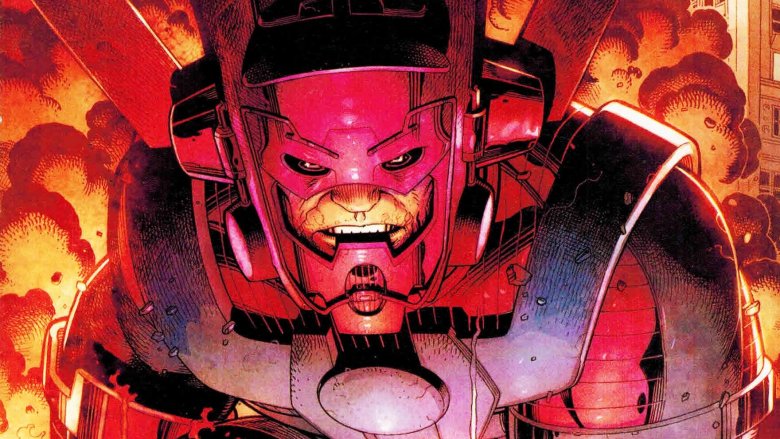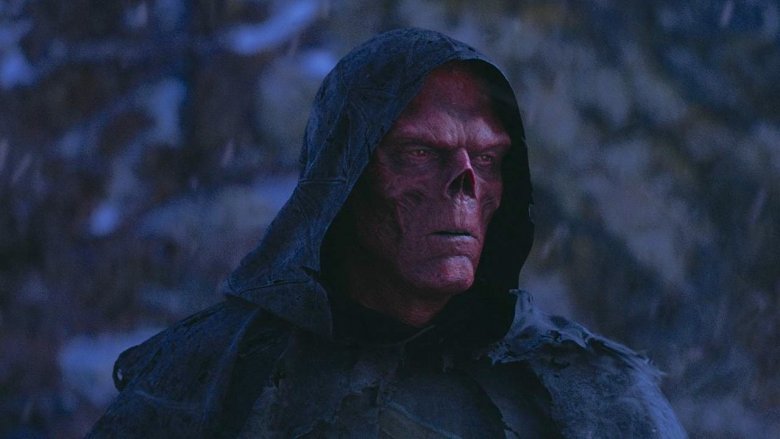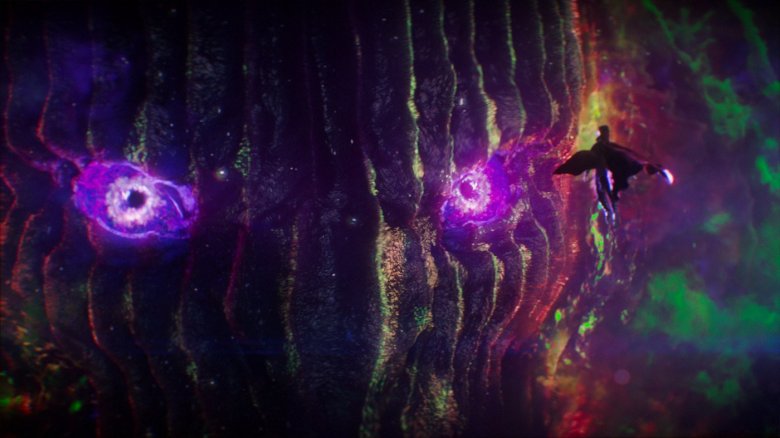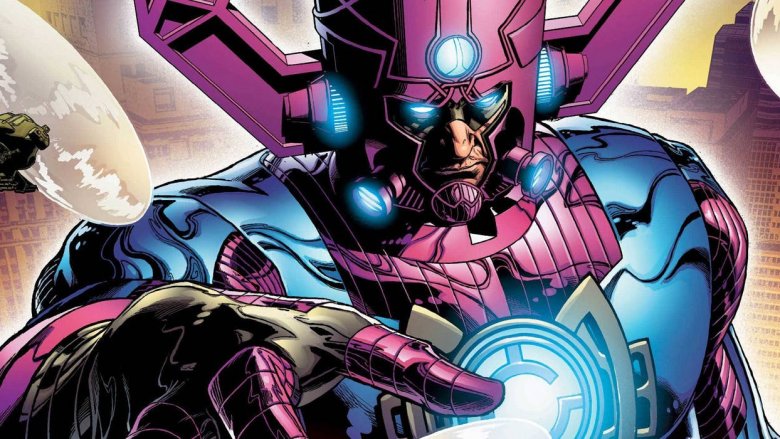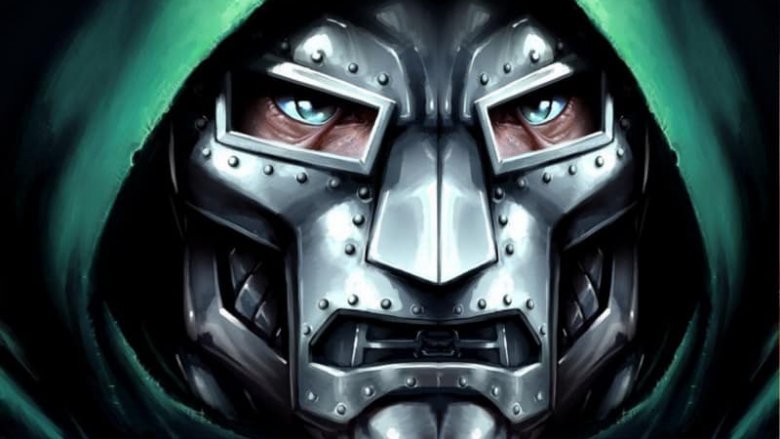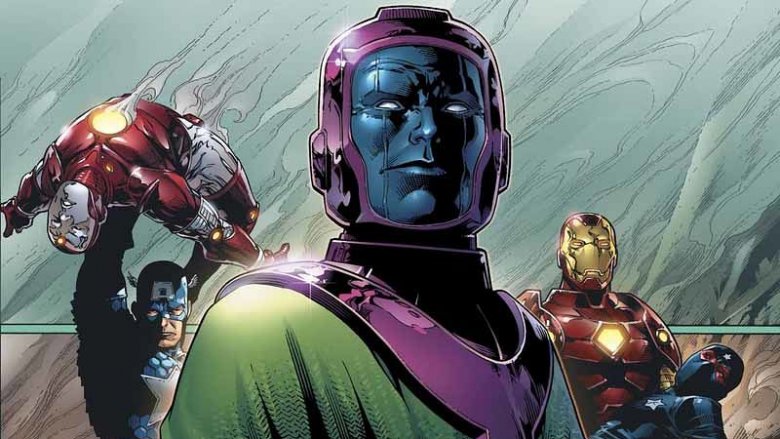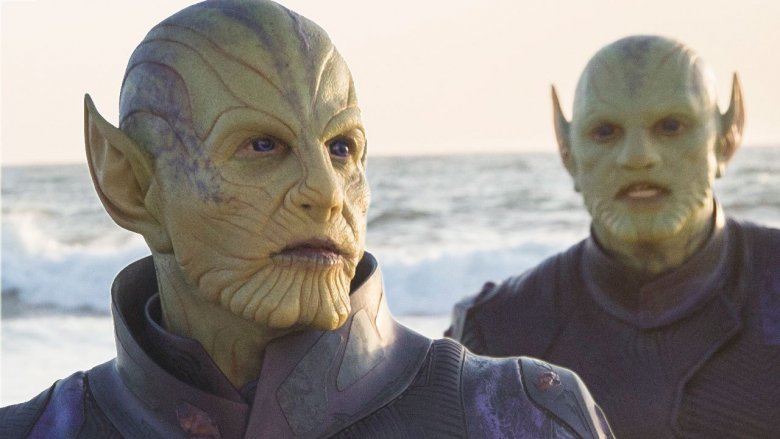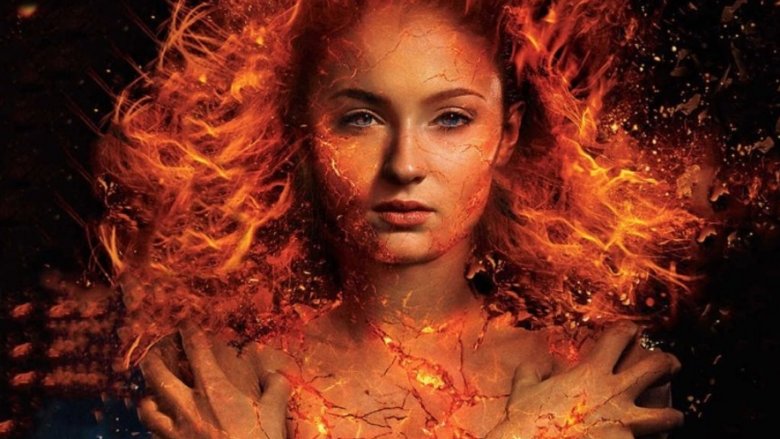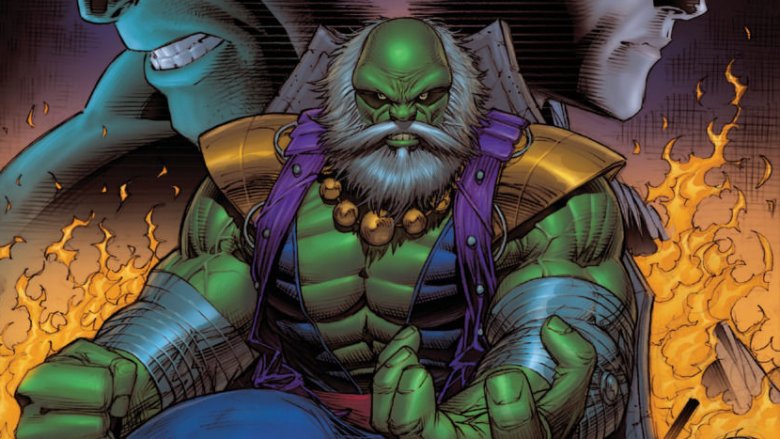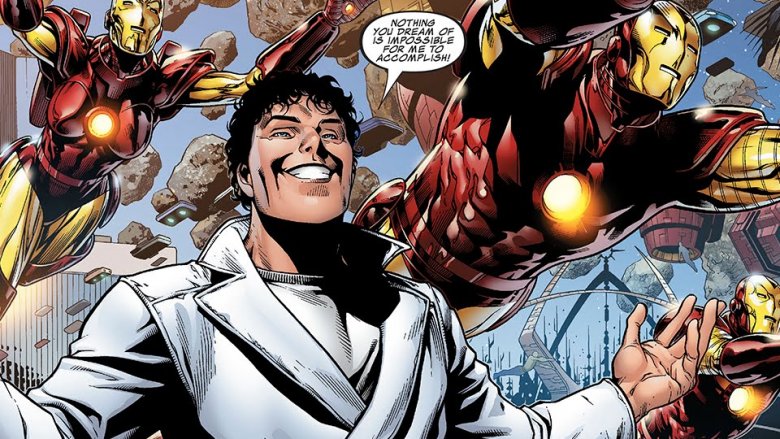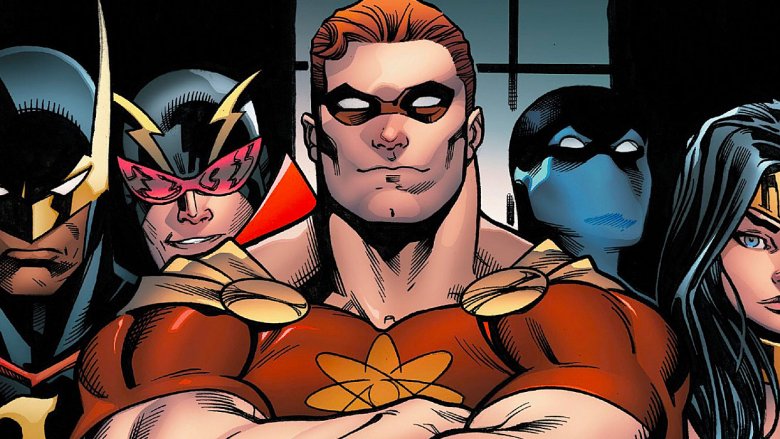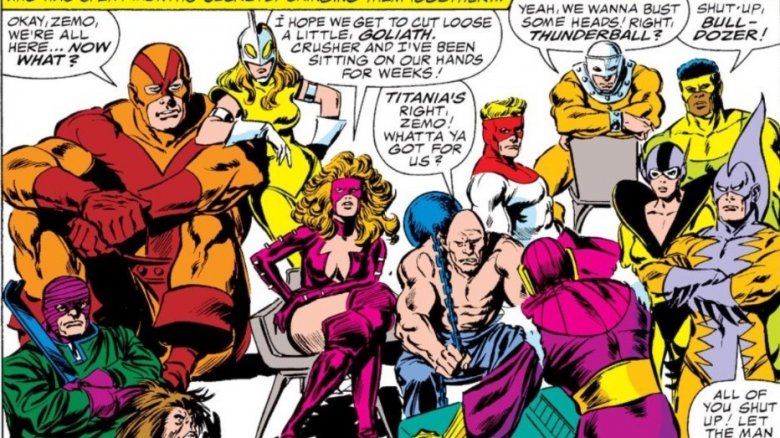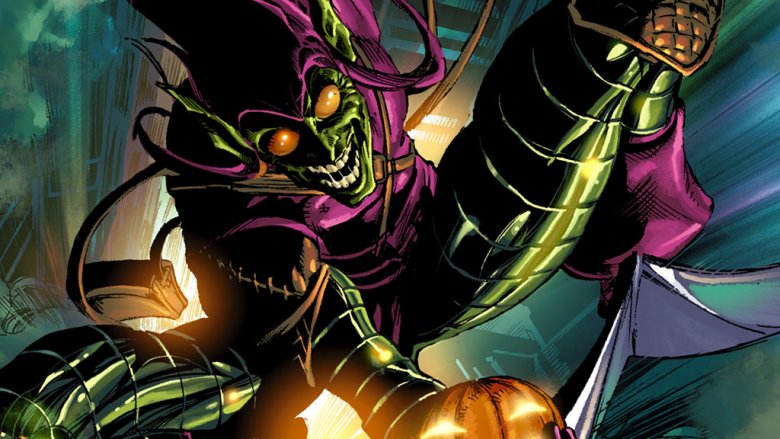Who Will Be The Next MCU Big Bad After Thanos?
Avengers: Endgame may very well be the last time we see Thanos as a villain in the MCU. He could survive the film, of course, but even if he does, it feels like by the time Endgame's credits roll, the Mad Titan's time will have come and gone. Despite how much creative control over the MCU has changed hands from Joss Whedon to Anthony and Joe Russo, Marvel Studios gave fans a masterful, slow build-up with Thanos as the Big Bad. It seems likely that rather than just keeping Thanos around in that role, Marvel is going to want to recruit another classic bad guy.
While the comics have plenty of bad guys to choose from, filling Thanos' shoes won't be easy. You'll need a fan-favorite if you want to elicit the same kind of response fans had when they saw that purple-skinned profile in the mid-credits scene of Avengers. Someone who can visually make the jump from the panels to the big screen. Someone who can threaten the narrative world of the MCU in ways no other single villain could.
For your consideration, here are some candidates for who the MCU's next Big Bad could be after Thanos.
A familiar face
One of the better kept secrets of Infinity War was the surprise appearance of Captain America's old enemy, the Red Skull. Audiences hadn't seen him on the big screen since 2011's Captain America: The First Avenger, and the crimson-faced Nazi's fate had been something of a mystery. The Tesseract proved too much for the villain in Captain America, but it wasn't clear if the artifact killed him, transported him, or something else. Infinity War revealed that the Skull was punished for his attempt to possess the Tesseract by being forced into the Soul Stone's servitude.
Hugo Weaving (who played the Red Skull in the first Captain America) wasn't behind the red make-up this time. Instead, it was Ross Marquand, best known as Aaron on AMC's The Walking Dead. It could be that Red Skull returning signifies nothing more than Joe and Anthony Russo wanting to give early MCU history a nod, but it could also be a test balloon.
The Red Skull is one of Marvel's oldest and most recognizable villains. Like Thanos, he often reaches for cosmic power to achieve his ends. Though usually associated with Captain America, he's had brutal rivalries with the Avengers, Black Panther, and even Wolverine. His brief appearance in Infinity War could be the Russo brothers' way of testing whether or not audiences would accept a Red Skull who isn't Hugo Weaving (since Weaving has made it clear he's not interested anymore).
Bargain or no bargain
Of the villains we've actually seen in the MCU, possibly the most staggeringly powerful (at least, without an Infinity Stone boost) was the godlike Dormammu of 2016's Doctor Strange. The good doctor's much-repeated phrase "Dormammu, I've come to bargain," signaled both a refreshing break from the usual superhero flick formula and an indication of exactly why the otherworldly terror would be such a devastating follow-up to Thanos as MCU's Big Bad. There was no possibility of Doctor Strange winning a fight with the gargantuan, ridgy-faced god. Instead he brought time, like an infection, into the Dark Dimension and tricked Dormammu into leaving Earth be.
Yes, Dormammu did promise to not bother the Earth again, but if a massive god in a timeless void who hungers to spread across all reality can't find a loophole in a contract, who can? In the many varied and nightmarish (and presumably fun, for Dormammu at least) ways we saw Dormammu slaughter Doctor Strange, it's clear there's no other villain we've seen in the MCU who could provide such a challenge. It would also be an interesting change from the status quo. While we've seen mystical villains in Doctor Strange and the Thor films, most of Marvel's movie bad guys come from the science-fiction camp. Seeing how heroes more rooted in science react in the face of threats whose powers can't be explained on a chalkboard could be a lot of fun.
A world eater
When a Marvel Comics reader thinks big, cosmic, world-threatening villain, Galactus is probably on their mind. While Wong referred to Dormammu as the "devourer of worlds" in Doctor Strange, in the comics it's Galactus who earns that title. Galactus must constantly feed on planets, draining and literally devouring all of their energy. To assist in this endless quest, he imbues heralds with a fraction of his power and sends them to search for suitable worlds. The most famous of these heralds is the Silver Surfer.
Like Dormammu, Galactus is not a villain the Marvel heroes could tackle in a purely physical battle. He wouldn't even treat them with the kind of vengeful sadism that we saw Dormammu use in Doctor Strange, because they couldn't even get enough of his attention to make him angry. The Avengers and the Guardians of the Galaxy would be like buzzing gnats to Galactus.
Galactus did kind of appear just before the birth of the MCU in 2007's Fantastic 4: Rise of the Silver Surfer, but not really — not in his full, purple, giant-headed glory. You want to hear fans cheer more than they did when Thanos was revealed in the Avengers mid-credits scene? End another mid-credits scene with two glowing eyes opening in the inky void of space and an oppressive voice booming, "I... HUNGER." You'll hear some cheers then. You'll hear cheers so loud you'll think they added a scene with Stan Lee kicking Star-Lord in a sensitive spot for screwing up Infinity War.
DOOM
If there is an undisputed alpha male of Earthbound Marvel villains, it's Doctor Doom. He boasts both scientific genius and mystical talent, and if physical might were based on nothing but sheer will, then Doom could knock the moon out of orbit by blowing a kiss. He's got on army of super-bots who look just like him, and he rules his Eastern European nation with a literal iron fist. He lives in a giant scary castle, and he constantly refers to himself in the third person (e.g. "Doom is supreme!") which is all kinds of awesome. And with Disney's acquisition of Fox, the ironclad nemesis of the Fantastic Four could finally find his way to the MCU.
There is something particularly appealing about Doom being the next Big Bad, not in spite of him lacking the godlike powers of a lot of other candidates, but because of it. In some ways (and this may sound bizarre at first, but bear with us), Doctor Doom is similar to Batman. Despite having no innate superhuman abilities, Doom isn't afraid of anyone. Whether you're Reed Richards, the Incredible Hulk, or a demonic god from another dimension, you will not make Doom give up an inch of ground. And more often than not, he'll win.
Time after time
Just about anything you can imagine from the more fantastic genres of fiction — e.g. supernatural horror, science fiction, high fantasy — has poked its head into the MCU. Marvel's films have given us warhammer-wielding gods fighting side-by-side with super strong monsters and flying men in robot suits. The films' villains include crooked business moguls, intergalactic warlords, goddesses of death, and sorcerers in the service of powerful demons.
There's one area of the fantastic that Marvel's movies have barely tapped into so far, even if it's arguably over-used in other popular science fiction — time travel. If a lot of the speculation about Avengers: Endgame is to be believed, then that's about to change. And once you open that particular Pandora's Box, you open an opportunity for one of the Avengers' most resilient comic book villains: Kang the Conqueror.
Instead of traveling to distant lands or planets for conquest, Kang brings his army of warriors to different eras to conquer. In one of the most memorable Kang stories — often referred to as "The Kang Dynasty" — Kang actually defeated the Avengers and ruled the Earth in a comic event that lasted over an entire year. He's one of the team's oldest villains, and a master of combat and time travel who could fill Thanos' shoes quite nicely.
A secret invasion
Ever since fans learned that the Skrulls would finally appear in the MCU in Captain Marvel, there's been speculation about a big screen version of Secret Invasion, the 2008 Marvel Comics event that revealed the shapeshifting aliens had been infiltrating the Earth for years. The release of Captain Marvel may leave some fans wondering about that, considering the Skrulls were revealed to be more victims than villains in the film, a refugee people on the run from the Kree who were trying to completely wipe them out.
But just because the Skrulls were on the right side of history in Captain Marvel doesn't mean a Secret Invasion is off the table. If there's one thing the various filmmakers of the MCU have proven, it's that they know how to give us memorable sympathetic villains, and the most sympathetic bad guys — like Loki and Killmonger — tend to be popular characters. Carol Danvers and her allies save the Skrulls in Captain Marvel, but they're still a people in desperate straits. It's conceivable they'll be willing to go down much darker paths to ensure their survival, or perhaps even to get revenge on the Kree.
From the ashes
With Disney finally bringing Fox under its tent, a meeting between the X-Men and the Avengers feels inevitable. While it may not be for a few years, one villain who could potentially provide the reason for the heroes to meet (and perhaps clash) is Dark Phoenix.
In Marvel Comics, the Phoenix Force is something often associated with Jean Grey, but it goes beyond her. A number of Marvel characters have possessed the destructive Phoenix Force over the years. Namor the Sub-Mariner, Colossus, Thane (the son of Thanos), and even Cyclops have all tasted the Phoenix's power. It was the impending arrival of the Phoenix Force that fueled the 2012 Marvel Comics event Avengers vs. X-Men.
In a sense, the Phoenix Force has been established as one of the first Avengers. When the Avengers comic was relaunched in 2018, writer Jason Aaron unveiled a secret prehistoric team of Avengers that included Thor's father Odin, the sorcerer Agomotto (an ancient predecessor to Doctor Strange), and a woman known as Lady Phoenix who was possessed by the Phoenix Force.
Future Imperfect
It isn't clear whether or not Mark Ruffalo will be continuing to appear as the Hulk after Avengers: Endgame. But if he does, and if he doesn't feel like playing an Avenger, there's another alternative.
The 1992 mini-series Incredible Hulk: Future Imperfect introduced readers to one of the Hulk's most popular villains. In a future where nuclear wars have left humanity devastated and utterly swept the globe free of superheroes or villains, a super strong genius named the Maestro rules over the city of Dystopia. A murderer and a greedy tyrant, the Maestro suffers his share of rebels, and some of them go back in time to find the one hero they think can stand up to him: the Hulk. Why do they pick the Hulk? Because the Maestro is the Hulk — an older, stronger, more vicious version of the Hulk.
An MCU Maestro would be amazing. Not only would the films' other heroes find him a physical challenge on par with Thanos, he would have the scientific genius to back it up. He'd be like Lex Luthor, if Lex Luthor could armwrestle Superman.
From Beyond
As far as pure power is concerned, few in the Marvel Universe can compare with the Beyonder. This godlike entity was behind the abduction of Marvel's heroes and villains in the 1984 mini-series Secret Wars. You never saw the Beyonder in any kind of physical form in that comic. He was a voice issuing from a rift in space, announcing that he was from "Beyond" and that he would give the super-people of Marvel whatever they desired if they destroyed their enemies. When the world-eater Galactus charged the rift, the Beyonder swatted him away like a fly.
In the following year's Secret Wars II, the curious Beyonder visited Earth in an attempt to learn more about the people he'd kidnapped for his own amusement so long ago. For most of the series, and the tie-ins throughout other Marvel titles, the Beyonder seemed like a fairly well-behaved child, but one who could turn an office building into a giant slab of gold with a thought. But eventually, the godlike man-child got dark, and the heroes needed to unite to put him down.
Whether or not an event like Secret Wars could be translated to the movie screen seems iffy at best. But you could say the same about Infinity War, Civil War, or even Avengers for that matter. At this point, it seems foolish to assume there's a Marvel Comics story that Marvel Studios can't tell.
The Squadron
Will we ever see an MCU/DCEU crossover? Will we watch Gal Gadot's Wonder Woman and Brie Larson's Captain Marvel lock horns? Will we see Thor sucker-punched by Shazam, or Hawkeye plugging up Deadshot's wrist barrels with some well-placed arrows? Well, if we don't, there's always the next best thing: the Squadron Supreme.
The concepts behind the Squadron Supreme heroes have bounced around in different forms for a while now. They've been Squadron Supreme, they've been Squadron Sinister. They've been characters existing in alternate timelines, and more recently, they've been tasked by the U.S. government to replace the Avengers.
Essentially, each member of Squadron Supreme is a clone of a DC hero, specifically members of the Justice League. Instead of Superman, there's Hyperion. Instead of Batman, there's Nighthawk. Wonder Woman is replaced by Power Princess. Doctor Spectrum stands in for Green Lantern.
The Squadron Supreme could be a risky proposition for Marvel Studios. On one hand, it would give them license to poke fun at their rivals. If not handled correctly, though, it could backfire and make Marvel seem petty.
The Masters
Marvel Studio's first phase was like nothing we've ever seen in the film industry. Characters from four separate properties came together for one super blockbuster, and the four characters in question couldn't have contrasted more with one another. Still, it was a massive hit and it changed what was possible in comic book movies. What if Marvel tried to do it with the bad guys instead of the good ones?
The Avengers' oldest rival team is known as the Masters of Evil. The supervillain conglomerate has appeared in many different forms over the years. The earliest incarnation had only four members — the Black Knight, Radioactive Man, the Melter, and Baron Zemo. The Masters' roster in the 1987 Avengers storyline "Under Siege" was massive, and they managed to wreck the Avengers mansion and put the demi-god Hercules in a coma. In perhaps their most brilliant move, the Masters of Evil waited until the world was desperate for heroes in the wake of the presumed deaths of the Avengers and Fantastic Four in 1997, disguised themselves as new heroes, and fooled the world in the comic Thunderbolts.
What if Marvel Studios could gather supervillains from across its properties and form one massive team to counter its heroes? What if Killmonger, Loki, Thanos, Hela, the Abomination, the Red Skull, Helmut Zemo, the Vulture, and more were all on the same team? The body count for that movie would make Infinity War look like Toy Story.
A goblin
One rumor claims that the MCU's next Big Bad won't be a world eater or another cosmic tyrant, but the classic Spidey villain Green Goblin. While Goblin is relatively low on the Marvel bad guy totem pole in terms of power, there are good reasons to believe the rumor has merit.
After 2006's Civil War comics event sees half of Marvel's heroes going underground and the events of 2008's Secret Invasion force Tony Stark out of his position as head of S.H.I.E.L.D., Norman Osborn — a.k.a. Green Goblin — takes credit for the defeat of the Skrulls and becomes more influential than ever. While in the films it's James Rhodes (Don Cheadle) who wears the red-white-and-blue armor known as Iron Patriot, in the comics it's Osborn who makes the Iron Man spinoff famous. As Iron Patriot, Osborn leads a team of Dark Avengers comprised of either less stable heroes like Sentry or villains disguised as heroes, like the villain Bullseye disguised as a new Hawkeye, and Venom disguised as Spider-Man.
Film industry insider Daniel Richtman claims that he's learned all about Green Goblin's MCU future, saying Goblin's going to be "the Lex Luthor/Joker... of the MCU... He'll be more important to the universe than Spidey." The rumor makes sense, particularly if Marvel Studios plans to follow the comics' example by making Osborn not just a psychotic villain, but — like DC's Lex Luthor — a corporate and political powerhouse with the rule of law on his side.
